(page1).jpg.jpg)
Title: Colored American - August 12, 1837
Speaker or author: editor
Newspaper or publication: Colored American (1837 - 1842)
In an effort to help, the friends of free African Americans are pushing them through an inadequate education and sending them into a prejudiced society unprepared for the challenges that await them there. By assuming that African Americans are not capable of more than this, those who are acting on their behalf, are doing more harm than good, even though their intentions are well meaning.
Description of file(s): one scanned, two columned, newspaper page
(page1).jpg.jpg)
Title: Colored American - December 2, 1837
Speaker or author: Sears, Robert
Newspaper or publication: Colored American (1837 - 1842)
The writer hopes that the recent murder of a newspaper owner in Illinois will cause the Church to change its position and begin to preach against slavery. By its silence (and even its own slave ownership in some cases), the Church conveyes a message of acceptance of slavery to its congregations. The writer emphasizes the power of the Church to sway public opinion and he hopes this event will stir ministers to action that will put an end to slavery and prejudice.
Description of file(s): one scanned, two columned, newspaper page
(page1).jpg.jpg)
Title: Colored American - June 1, 1839
Speaker or author: editor
Newspaper or publication: Colored American (1837 - 1842)
The writer expresses his outrage over the treatment of Lewis Tappan as he dealt with his current court case.
Description of file(s): one scanned newspaper column
(page1).jpg.jpg)
Title: Colored American - June 2, 1838
Speaker or author: editor
Newspaper or publication: Colored American (1837 - 1842)
The writer comments on the split in the Presbyterian Church. He promises to provide further commentary in an upcoming issue of the paper.
Description of file(s): one scanned, one columned, newspaper page
(page1).jpg.jpg)
Title: Colored American - June 2, 1838
Speaker or author: editor
Newspaper or publication: Colored American (1837 - 1842)
The editor responds to a comment made about his move to the country from the city of New York that was delivered before a meeting of the anti-slavery society. He notes that some of the information given about his motivations is incorrect.
Description of file(s): one scanned, two columned, newspaper page
(page1).jpg.jpg)
Title: Colored American - March 16, 1839
Speaker or author: editor
Newspaper or publication: Colored American (1837 - 1842)
The writer, a clergyman, expresses his frustration with being ignored by the clergy and Christians in his neighborhood. He believes this is because he is African American and that it wouldn't happen if he were white.
Description of file(s): one scanned newspaper column
(page1).jpg.jpg)
Title: Colored American - March 9, 1839
Speaker or author: editor
Newspaper or publication: Colored American (1837 - 1842)
The writer comments on remarks made by David Hale, publisher of the Journal of Commerce, regarding those who assume positions of authority.
Description of file(s): one scanned, two columned, newspaper page
(page1).jpg.jpg)
Title: Colored American - September 16, 1837
Speaker or author: editor
Newspaper or publication: Colored American (1837 - 1842)
The writer stresses the benefits of education. While it is difficult for African Americans to obtain a quality education through the usual means, entering the ministry offers a way that they may not have had otherwise.
Description of file(s): two scanned newspaper pages (three columns)
(page1).jpg.jpg)
Title: Colored American - September 8, 1838
Speaker or author: editor
Newspaper or publication: Colored American (1837 - 1842)
The writer comments on the idea that while the Church condemns sins such as intemperance and those who don't keep the Sabbath holy, they continue to participate in the worst social sin of all: the holding of slaves and the silent condoning of continued slavery.
Description of file(s): one scanned, two columned, newspaper page
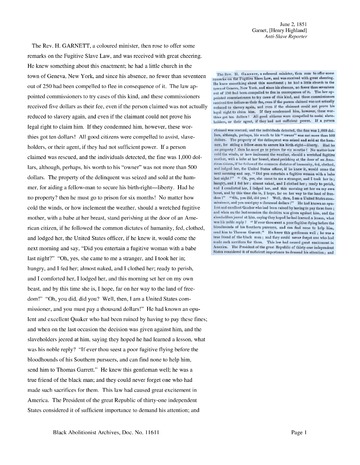
Speaker or author: Garnet, Henry Highland, 1815-1882
Newspaper or publication: Anti-Slavery Reporter
Speech denouncing the Fugitive Slave Law, and focusing on the efforts of the Church in the continuation of the system of slavery.
Description of file(s): PDF 2 page, 882 word document (text and images)
(page1).jpg.jpg)
Speaker or author: editor
Newspaper or publication: Impartial Citizen (1849 - 1851)
The writer comments on the praise given to Henry Clay by Reverend Peabody. The writer disagrees with Reverend Peabody's assertion that Mr. Clay has done "more than all the anti-slavery men of the north united," and instead points to all that Mr. Clay has done to help slavery continue.
Description of file(s): one scanned, two columned, newspaper page
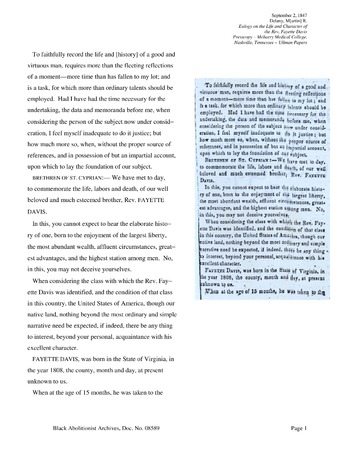
Speaker or author: Delany, Martin Robison, 1812-1885
Newspaper or publication: Presscopy -- Meharry Medical College, Nashville, Tennessee -- Ullman Papers
Eulogy on the life and history of the Reverend Fayette Davis. The speaker traces Rev. Davis' life from Virginia where he was born free, through his childhood in Kentucky (a slave state where his opportunities were limited), his marriage, his career choice as a member of the clergy, and finally his early death.
Description of file(s): PDF 12 page, 3,286 word document (text and images)
(page1).jpg.jpg)
Title: Provincial Freeman - September 29, 1855
Speaker or author: editor
Newspaper or publication: Provincial Freeman (1853 - 1859)
The writer comments on the story of two clergymen of African heritage who were refused entry to a saloon on board a steam ship that they had paid full fare to travel aboard.
Description of file(s): three scanned, two columned, newspaper pages (portion damaged and/or missing)
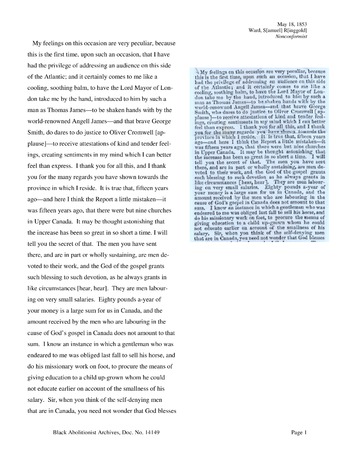
Speaker or author: Ward, Samuel Ringgold, b. 1817
Newspaper or publication: NonConformist
Speech delivered in London before the Colonial Missionary Society reporting on the speaker's experiences in Canada and the clerical work being done there.
Description of file(s): PDF 3 page, 1,027 word document (text and images)
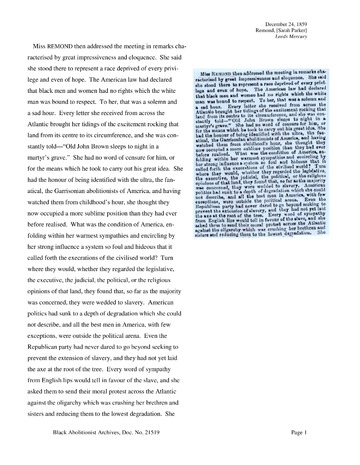
Speaker or author: Remond, Sarah Parker, 1826-1887?
Newspaper or publication: Leeds Mercury
Impassioned speech regarding the sacrifice of men like John Brown, who had been executed a few days before. The speaker emphasized the role of the Church, as well as the government in protecting and continuing the system of slavery in the U.S. They had now gone too far in this role by taking the life of John Brown.
Description of file(s): PDF 2 page, 425 word document (text and images)
(page1).jpg.jpg)
Title: Voice of the Fugitive - June 18, 1851
Speaker or author: editor
Newspaper or publication: Voice of the Fugitive (1851 - 1852)
The editor responds to a reader who took exception to an article accusing northern Methodist Episcopal ministers of slave-holding. This is just one more way that the Church seems to condone slavery.
Description of file(s): one scanned, two columned, newspaper page
(page1).jpg.jpg)
Title: Weekly Anglo-African - April 6, 1861
Speaker or author: editor
Newspaper or publication: Weekly Anglo-African (1859 - 1862)
The editor informs his readers that donations are currently being accepted to purchase gifts of appreciation to be awarded to Henry Highland Garnet and his wife.
Description of file(s): one scanned newspaper column
(page1).jpg.jpg)
Title: Weekly Anglo-African - February 9, 1861
Speaker or author: editor
Newspaper or publication: Weekly Anglo-African (1859 - 1862)
The writer comments on the news from Hayti published in a Haytian newspaper he recently received.
Description of file(s): one scanned, two columned, newspaper page
(page1).jpg.jpg)
Title: Weekly Anglo-African - January 26, 1861
Speaker or author: editor
Newspaper or publication: Weekly Anglo-African (1859 - 1862)
The writer urges his readers to contribute more towards the salary of ministers.
Description of file(s): one scanned, two columned, newspaper page
(page1).jpg.jpg)
Title: Weekly Anglo-African - October 15, 1859
Speaker or author: editor
Newspaper or publication: Weekly Anglo-African (1859 - 1862)
The writer shares a plea from an enslaved minister asking the public's help to raise money to purchase his freedom.
Description of file(s): one scanned newspaper column
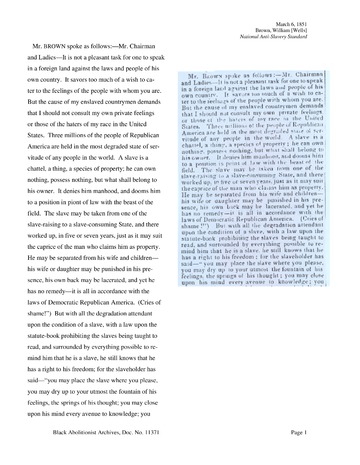
Speaker or author: Brown, William Wells, 1814?-1884
Newspaper or publication: National Anti-Slavery Standard
Speech denouncing the Fugitive Slave Bill, and expressing the speaker's belief regarding the continuation of the institution of slavery. The speaker emphasized the role the Church plays in keeping slavery in place and the unspoken approval of racial prejudice that this offered society.
Description of file(s): PDF 7 page, 1,831 word document (text and images)



